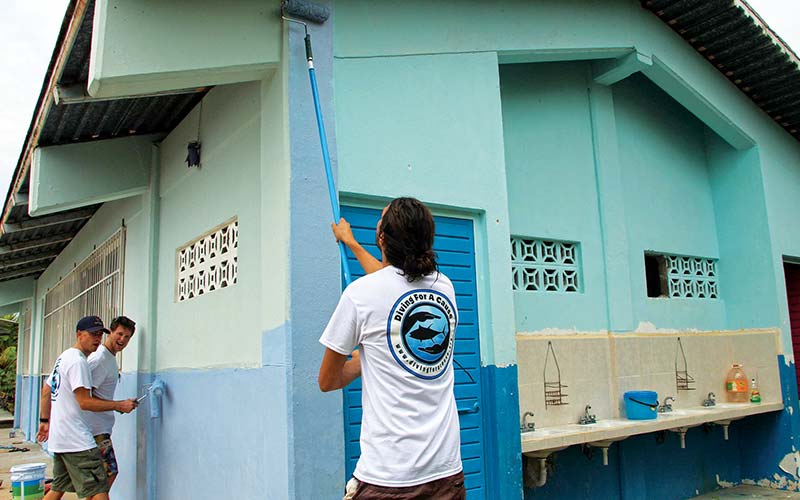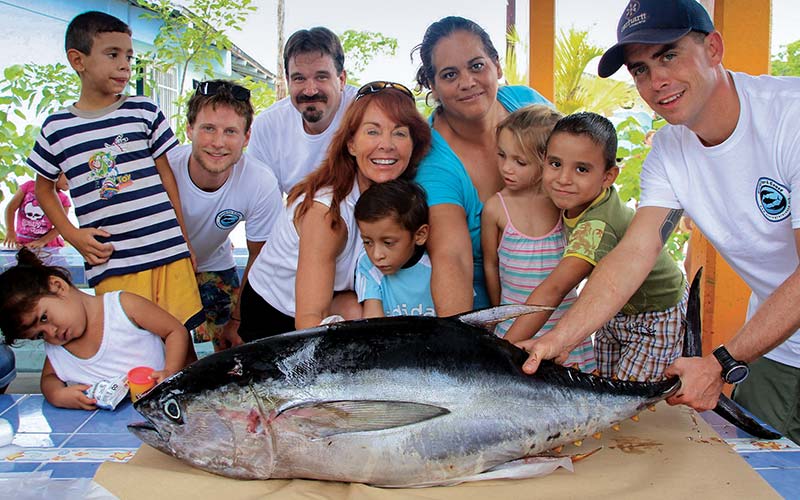Packing up after a scuba dive in Bali five years ago, Colleen Gallagher heard a local guide lamenting that he had nothing to take to the wake of a relative who had died. Another diver grabbed his spearfishing gear, jumped back into the water, and returned shortly with two large fish, which he gave to the man.
“I was struck by the way one person helped another without batting an eye. I started thinking about founding a nonprofit to combine spearfishing with giving back to the community,” Gallagher said. An ICU charge nurse dedicated to helping others, she was instilled with a passion for spearfishing by her now-deceased friend Bonnie Row. Gallagher’s combination of these two abiding commitments laid the foundation for Diving for a Cause. The first trip she organized concluded with a donation of almost 500 pounds of fish to an orphanage in Baja California.
Since then, Gallagher has organized other trips — to Greece, New Zealand, Panama, the Bahamas, Costa Rica, Madagascar and elsewhere — aiming for a trip every month. DFAC has also returned to Baja, staying again at Palapas Ventana, a collection of seaside casitas owned by Tim Hatler, who helped with the first trip. Californian Eric Smail, who previously worked for Hatler as a divemaster, led one of those trips.
The spearfishermen took children from the local orphanage snorkeling. “It was the first time most of them had worn a mask and looked into the ocean,” Smail says. “Some of them were very shy, but they started having fun and then we had to drag them out of the water.” On the final day of the trip, the group formed a bucket brigade from their vehicle to the orphanage freezer to deliver the donated fish. “Passing it along that way, you got a sense of how much we’re actually donating,” he adds. “It was several large coolers full of some really nice fish.” The divers then ate dinner with the kids and ended the evening with a soccer game.

Participants on DFAC trips always freedive. According to freediving veteran and safety pioneer Dr. Terry Maas, “DFAC combines the spirit of community service with ethical spearfishing practices — catching only what can be used, avoiding endangered or scarce populations and not taking large breeding fish as trophies. Diving for a Cause is as much about responsible spearfishing as it is providing community service.”
Gallagher points out that the selective nature of spearfishing is used to limit its potential impact on fish populations and that DFAC pays careful attention to regulations and limits. The group’s emphasis on service also creates a different atmosphere. “No one cares who gets the biggest fish. It takes away the whole competition side of it,” she said. “We’re doing it as a team, and we all give it away.” Bill Ernst, a retired firefighter in California and long-time competitive spearfisherman, went on a recent DFAC trip to Greece, which donated fish to three local charities. “Spearfishing seems a lot more fair to me than other ways of taking fish,” he said. “You’re on their terms.”
Before Diving for a Cause visits a particular destination, Gallagher sends scouts to make contact with local schools or other charitable entities and to coordinate supplies with resort owners. This ensures the days of community service make efficient use of volunteers’ time. Resorts offer discounted services because of the tremendous goodwill generated in the communities. “Local residents can be initially skeptical of resort patrons suddenly dropping into their world,” Gallagher said, “but soon warm to the genuine interest, contributions and friendship offered by DFAC members.” Many encourage the group to return.

A typical DFAC trip lasts a week and combines several days of spearfishing with at least two days of community service. Divers donate 70 percent or more of their catch and pitch in on a service project. They take along donated masks, snorkels and soccer balls to give to local children in person. They also take books and education supplies to schools and participate in classroom activities, often reading the books they brought. They paint buildings, make electrical repairs and generally add lasting improvements wherever they go.
The program is so popular that destinations have requested DFAC visits, said Maas. “We’re not going to save the world with two or three days of community service, but it leaves everybody, participants and recipients, with such a good feeling. The goodwill we leave in the community cannot be measured.” Those hundreds of pounds of fish put in the freezers of orphanages, food kitchens and elder-care facilities, however, can be.
© Alert Diver — Q 1 Winter 2013